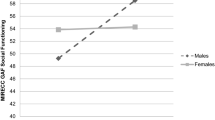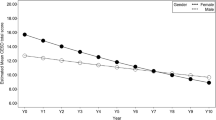Abstract
We examined the prospective impact of depression on objective ratings of disability as a function of gender in a sample of persons with rheumatoid arthritis. Forty-two individuals from an outpatient rheumatology clinic completed measures of depression, disability, and pain over the course of 1 year. A physician's assistant completed objective measures of functional disability following a routine physical examination. Results demonstrated a significant main effect for gender on Time 2 objective ratings of disability (after controlling for disease variables and self-report indices of pain and disability), indicating that physician assistants rated female participants as more disabled than male participants. Importantly, the interaction of gender and Time 1 depression contributed significant variance to Time 2 disability. Findings suggest that women, relative to men, may experience greater declines in functional capacity over time, independent of self-perceptions of pain and disability, and that depression plays a significant role in this process. Discussion focuses on treatment considerations for health care teams, with particular focus on women's adjustment of to RA.
Similar content being viewed by others
REFERENCES
Allaire, S. H., Meenan, R. F., and Anderson, J. J. (1991). The impact of rheumatoid arthritis on the household work performance of women. Arth. Rheum. 34(6): 669–678.
American Psychiatric Association (1994). Diagnostic and Statistical Manual of Mental Disorders (4th ed.), APA, Washington, DC.
Arnett, F., Edworthy, S., Bloch, D., McShane, D., Fries, J., Cooper, N., Healy, L., Kaplan, S., Liang, M., Luthra, H., Medsger, T., Jr., Mitchell, D., Neustadt, D., Pinals, R., Schaller, J., Sharp, J., Wilder, R., and Hunder, G. (1988). The American Rheumatism Association 1987 revised criteria for the classification of rheumatoid arthritis. Arth. Rheum. 31: 315–324.
Bhatia, S. C., and Bhatia, S. K. (1999). Depression in women: Diagnostic and treatment considerations. Am. Family Phys. 60(1): 225–234, 239–240.
Callahan, L. F., Brooks, R. H., and Pincus, T. (1988). Further analysis of learned helplessness in rheumatoid arthritis using a Rheumatology Attitudes Index. J. Rheumatol. 15: 418–426.
Chaney, J. M., Mullins, L. L., Uretsky, D. L., Doppler, M. J., Palmer, W. R., Wees, S. J., Klein, H. S., Doud, D. K., and Reiss, M. J. (1996a). Attributional style and depression in rheumatoid arthritis: The moderating role of perceived illness control. Rehab. Psychol. 3: 205–223.
Chaney, J. M., Uretsky, D. L., Mullins, L. L., Doppler, M. J., Palmer, W. R., Wees, S. J., Klein, H. S., Doud, D. K., and Reiss, M. J. (1996b). Differential effects of age and illness duration on pain-depression and disability-depression relationships in rheumatoid arthritis. Int. J. Rehab. Health 2(2): 101–112.
Cronbach, L. (1951). Coefficient alpha and the internal structure of tests. Psychometrika 16: 297–334.
Dowdy, S. W., Dwyer, K. A., Smith, C. A., and Wallston, K. A. (1996). Gender and psychological well-being of persons with rheumatoid arthritis. Arth. Care Res. 9(6): 449–456.
Fifield, J., Tennen, H., Reisine, S., and McQuillan, J. (1998). Depression and the long-term risk of pain, fatigue, and disability in patients with rheumatoid arthritis. Arth. Rheum. 41(10): 1851–1857.
Frank, R. G., Chaney, J. M., Clay, D. L., and Kay, D. R. (1991). Depression in rheumatoid arthritis: A re-evaluation. Rehab. Psychol. 36: 219–230.
Frank, R. G., Chaney, J. M., Clay, D. L., Shutty, M. S., Beck, N. C., Kay, D. R., Elliott, T. R., and Grambling, S. (1992). Dysphoria: A major symptom factor in persons with disability or chronic illness. Psychiatry Res. 3: 231–241.
Fries, J. F., Spitz, P., Kraines, R. G., and Holman, H. R. (1980). Measurement of patient outcome in arthritis. Arth. Rheum. 23(2): 137–145.
Gerber, L. (1988). Outcome measures in rheumatic disease. In Hicks, J., Nichols, J., and Sweezy, R. (eds.), Handbook of Rehabilitative Rheumatology, American Rheumatism Association, Atlanta, pp. 9–19.
Hollingshead, A. (1957). Two Factor Index of Social Position, Author, New Haven, CT.
Hommel, K. A., Chaney, J. M., Mullins, L. L., Palmer, W., Wees, S., and Klein, H. (1998). The relative contributions of attributional style and arthritis helplessness to depression in rheumatoid arthritis: A longitudinal investigation. Int. J. Rehab. Health 4(1): 59–67.
Katz, P. P., and Yelin, E. H. (1994). Life activities of persons with rheumatoid arthritis with and without depressive symptoms. Arch. Care Res. 7(2): 69–77.
Kroenke, K., and Spitzer, R. L. (1998). Gender differences in the reporting of physical and somatoform symptoms. Psychosom. Med. 60: 150–155.
Lorish, C. D., Abraham, N., Austin, J., Bradley, L. A., and Alarcon, G. S. (1991). Disease and psychosocial factors related to physical functioning in rheumatoid arthritis. J. Rheumatol. 18(8): 1150–1157.
Maier, W., Gansicke, M., Gater, R., Rezaki, M., Tiemens, B., and Urzua, R. F. (1999). Gender differences in the prevalence of depression: A survey in primary care. J. Affect. Disord. 53(3): 241–252.
Murphy, H., Dickens, C., Creed, F., and Bernstein, R. (1999). Depression, illness perception and coping in rheumatoid arthritis. J. Psychosom. Res. 46: 155–164.
Nicassio, P., Wallston, K., Callahan, L., Herbert, M., and Pincus, T. (1985). The measurement of helplessness in rheumatoid arthritis: The development of the Arthritis Helplessness Index. J. Rheumatol. 12: 462–467.
Novy, D. M., Nelson, D. V., Averill, P. M., and Berry, L. A. (1996). Gender differences in the expression of depressive symptoms among chronic pain patients. Clin. J. Pain 12: 23–29.
Parker, J. C., and Wright, G. E. (1995). The implications of depression for pain and disability in rheumatoid arthritis. Arth. Care Res. 8(4): 279–283.
Pease, C. T., Bhakta, B. B., Devlin, J., and Emery, P. (1999). Does the age of onset of rheumatoid arthritis influence phenotype?: A prospective study of outcome and prognostic factors. Rheumatology 38(3): 228–234.
Peck, J. R., Smith, T. W., Ward, J. R., and Milano, R. (1989). Disability and depression in rheumatoid arthritis: A multi-trait, multi-method investigation. Arth. Rheum. 32(9): 1100–1106.
Pincus, T., Summey, J., Soraci, S., Wallston, K., and Hummon, N. (1983). Assessment of patient satisfaction in activities of daily living using a modified Stanford Health Assessment Questionnaire. Arth. Rheum. 26: 1346–1353.
Robinson, M. E., Wise, E. A., Riley, J. L., and Atchison, J. W. (1998). Sex differences in clinical pain: A multisample study. J. Clin. Psychol. Med. Sett. 5(4): 413–424.
Smith, T. W., Peck, J. R., Milano, R. A., and Ward, J. R. (1988). Cognitive distortion in rheumatoid arthritis: Relation to depression and disability. J. Consult. Clin. Psychol. 56(3): 412–416.
Smith, C., Wallston, K., and Dwyer, K. (1995). On babies and bathwater: Disease impact and negative affectivity in the self-report of persons with rheumatoid arthritis. Health Psychol. 14: 64–73.
Weissman, M. M. (1984). The epidemiology of depression: An update on sex differences in rates. J. Affect. Disorders 7(3–4): 179–188.
Wilder, R. (1993). Rheumatoid arthritis. In Schumacher, H. R., Jr., Klippel, J. H., and Koopman, W. J. (eds.), Primer on the Rheumatic Diseases: Tenth Edition, Arthritis Foundation, Atlanta, GA, pp. 86–89.
Wool, C. A., and Barsky, A. J. (1994). Do women somatize more than men? Gender differences in somatization. Psychosomatics 35: 445–452.
Zimmerman, M., and Coryell, W. (1987). The Inventory to Diagnose Depression: A self-report scale to diagnose major depressive disorder. J. Consult. Clin. Psychol. 55: 55–59.
Zimmerman, M., and Coryell, W. (1988). The validity of a self-report questionnaire for diagnosing major depressive disorder. Arch. Dis. Unrelated Psychiatry 45: 738–740.
Zimmerman, M., and Coryell, W. (1994). Screening for major depressive disorder in the community: A comparison of measures. Psychol. Assess. 6: 71–74.
Zimmerman, M., Coryell, W., Wilson, S., and Corenthal, C. (1986). Evaluation of symptoms of major depressive disorder: Self-report vs. clinician ratings. J. Nerv. Ment. Dis. 174: 150–153.
Author information
Authors and Affiliations
Rights and permissions
About this article
Cite this article
Hommel, K.A., Wagner, J.L., Chaney, J.M. et al. Gender-Specific Effects of Depression on Functional Disability in Rheumatoid Arthritis: A Prospective Study. International Journal of Rehabilitation and Health 4, 183–191 (1998). https://doi.org/10.1023/A:1022958730413
Issue Date:
DOI: https://doi.org/10.1023/A:1022958730413




